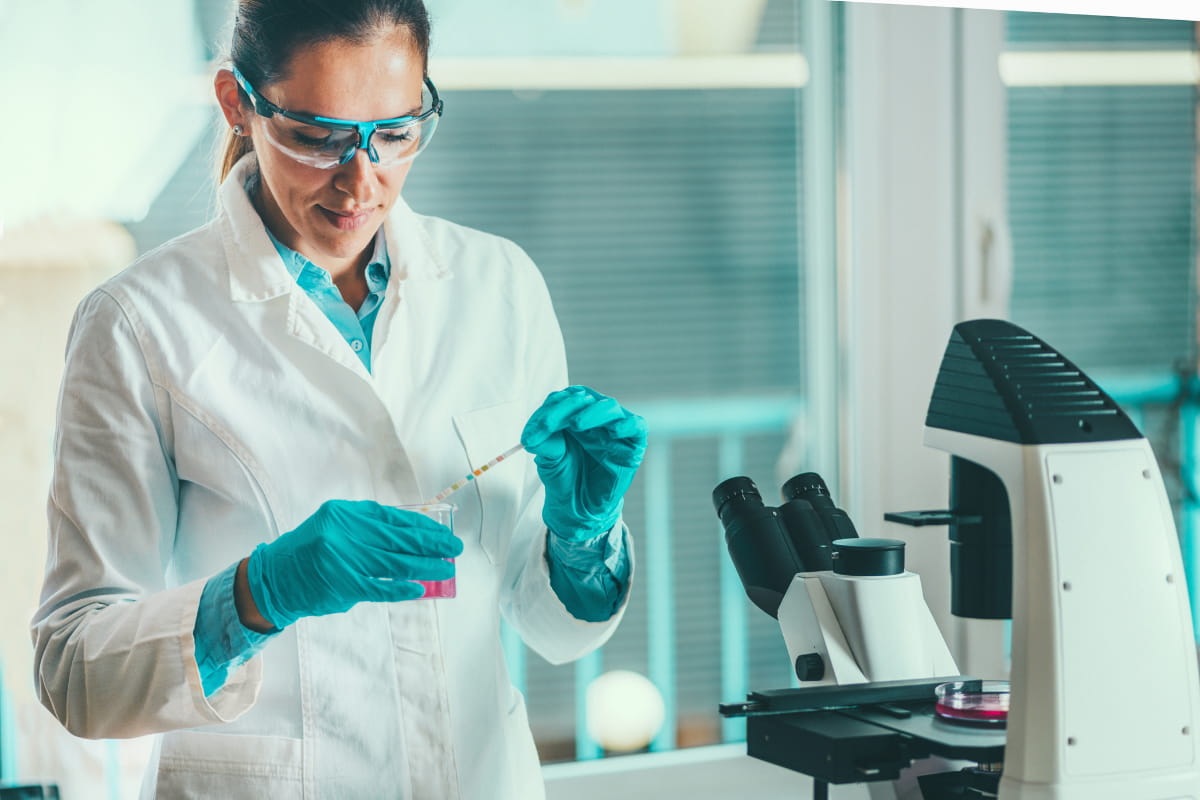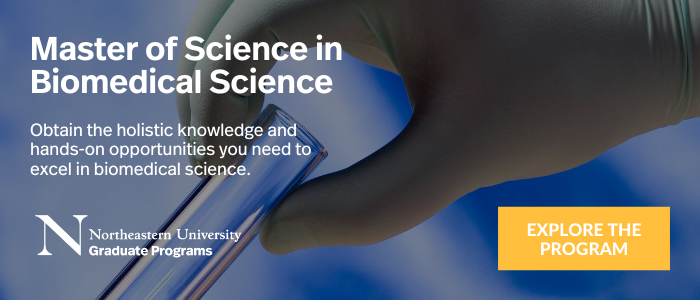“Biomedical science” refers to a set of disciplines that apply natural and formal sciences to knowledge, interventions, and technologies that are used in healthcare and public health. The field is particularly relevant today, as some of these professionals have been working toward developing, testing, manufacturing, and administering vaccines to fight COVID-19.
People in this field—or those interested in breaking into it—often hold a master’s in biomedical science. This degree integrates study across several areas of contemporary biomedicine, including human physiology and pathophysiology, pharmacology, and biochemistry.
“It’s a very interdisciplinary program and it’s pitched toward people who may already be in the healthcare field who want to have a broader and deeper appreciation of modern medicine, therapeutics, their application, and their pharmacology,” says David Janero, director of the pharmaceutical sciences graduate programs at Northeastern University. These graduates have moved into roles that include research technicians, clinical laboratory workers, science teachers, and science administrators.
But what can you do with a master’s in biomedical science? Graduating with this degree gives you the ability to advance your career and land roles that allow you to perform exciting and important work in biomedical science. What’s more, the specialized knowledge you can gain in this program can be the key to taking on similar roles that allow you to make a real impact on the future of healthcare.
Read on to learn more about some possible careers, the impact that others have had in the field, and how you can get started or excel in this exciting field.
Careers in Biomedical Science
Professionals in this field with a master’s in biomedical science hold a variety of jobs across a number of disciplines. These jobs include:
- Laboratory Technicians: These professionals primarily work in a wet-lab setting. They participate in drug discoveries, profile novel compounds as potential drugs, synthesize and purify new chemical matter, and more.
- Biomedical Scientists: Biomedical scientists may work independently or under the supervision of PhD-level scientists to design and implement experiments in a research environment. They often publish articles on their findings in academic journals, as well.
- Clinical Research Associates: These professionals provide advanced technical support during the clinical research process, including testing, handling equipment, and presenting findings.
- Medical Writers: These individuals create educational materials, training documentation, and manuals for people without medical backgrounds. Medical writers often conduct the research used within these assets, and are responsible for ensuring that their writing is understood by people in the medical field and the public.
- Medicinal Chemists: Senior medicinal chemists create the chemicals and compounds that are used to develop medicinal drugs. They make adjustments to the compounds and study their reactions, leveraging this data to understand how they might behave in the human body.
What type of work can you do in the field of biomedical science?
Though the list above offers just a small sampling of titles held by professionals in the biomedical science field, the opportunities available to those with the proper training are much more extensive. Yet the fast-paced, constantly evolving industry of biomedical science allows professionals to become part of groundbreaking work no matter their specific title.
For example, Shalaka Deshmukh—a 2019 graduate of Northeastern’s master’s in biomedical science program—works as a research associate in the Discovery Biology function of Surrozen, a biotech startup in San Francisco.
Advance Your Career with a Master’s in Biomedical Science
Learn how to transform your career in an industry that’s transforming the world.
In her current position, Deshmukh focuses on histology, which is the study of the microscopic structure of tissues. She explains that, in knowing what healthy tissue looks like and how it normally functions, scientists are better able to recognize different diseases. Histology also helps in determining the causes of diseases, how to treat them, and whether a treatment has worked effectively.
According to Deshmukh, Northeastern’s program was key in helping to advance her career.
“The practical experience that this program offers is unparalleled and has helped me get my foot in the door in the industry,” she says, explaining that she chose the program because it provided her with the flexibility to choose courses outside of the regular coursework. In her case, these outside courses included molecular biology, which is the field she’s currently working in.
From Janero’s view, Deshmukh’s experience is just one representation of the many exciting biomedical science opportunities available to graduates. Precision gene engineering, for example, is garnering attention today for its ability to engineer or modify one’s genome for a therapeutic effect. This could erase someone’s propensity for depression, for instance. The 2020 Nobel Prize in chemistry was awarded to two researchers in this field who discovered a way to alter the DNA of animals, plants, and microorganisms with extremely high precision.
Another exciting area in biomedical science is probing mechanisms of disease in which you find new drug targets and validate them. “This is one area that’s very important now,” Janero says. “Cancer, for example, covers a multitude of complex diseases. We’re now beginning to understand disease patterns at levels where we see that one-word descriptives are no longer really valid in terms of disease progression and optimal therapy from one patient to another.”
This leads to another important area in biomedical science, which is precision medicine. Precision medicine looks at the genetics, environment, and lifestyle of a person in order to select the treatment that could work best for them. “The idea here is that the medication would be more precise in terms of its therapeutic effect, and less inviting in terms of side effects or adverse events,” Janero says.
Finally, people interested in biomedical science have the opportunity to explore medical products like biologics, which are drugs made from living organisms or components of living organisms. These drugs are used to treat many conditions, including various cancers, Crohn’s disease, ulcerative colitis, diabetes, and more.
Advancing your education is a critical step that will open doors and help people pursue passions like these and develop rewarding careers within this fast-paced field.
The Northeastern Difference
Earning an advanced degree is a key component in pursuing various exciting and important opportunities in the biomedical science field. Northeastern University’s master’s in biomedical science provides students with the education, faculty, and industry contacts necessary to make these careers a reality.
“We’re centrally positioned within the Boston biomedical nexus,” Janero says. “Most of our faculty has some involvement with the Boston-area biotech arena. The hands-on experience that students get here is what really makes a big difference.”
Students enrolled in Northeastern’s program have the opportunity to get that real-world experience through experiential learning. Biomedical science students have been placed at Merck & Co., Merck Research Laboratories, Massachusetts Institute of Technology, Cytotherax Corporation, and Acceleron Pharma, among other top companies in the industry.
What also sets Northeastern’s program apart, Janero says, is the opportunity for specializations. “If a student is interested in herbal medications, for example, we have courses that focus on natural medications,” he says. “There are ways beyond the core curriculum that one can specialize, not only in terms of deepening a student’s knowledge in a particular area, but also to explore new areas that might help with a job search, promotion, or advancement in their current job.”
Northeastern University’s master’s in biomedical science program opens many doors to exciting and important careers in the field, enabling you to make a difference.
Ready to take the next step in advancing your biomedical science career? Explore the master’s in biomedical science program at Northeastern.







Related Articles
Compliance Specialists: Who They Are and What They Earn
Science or Science Fiction? The Future of Personalized Medicine
In-Demand Biotechnology Careers Shaping Our Future